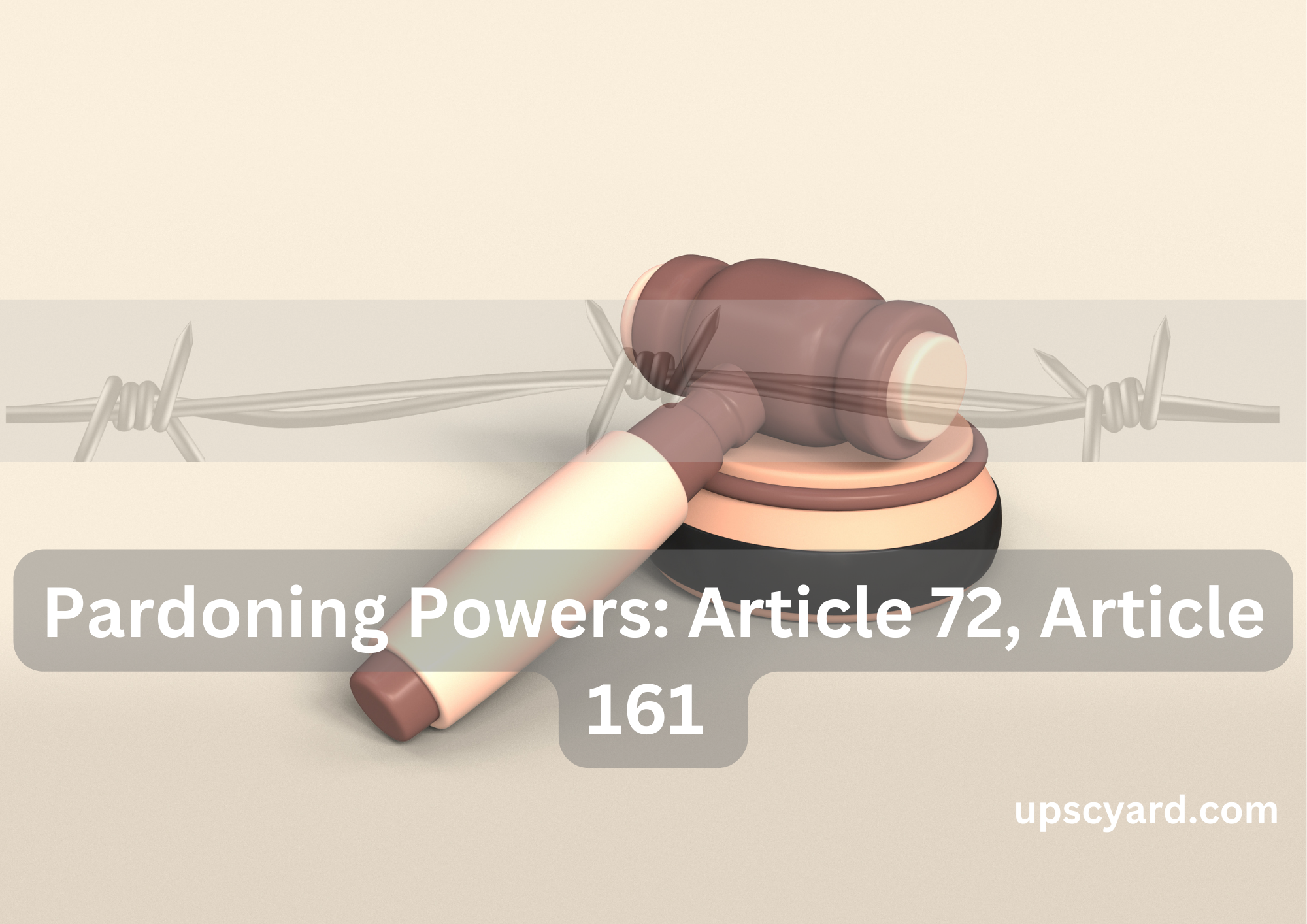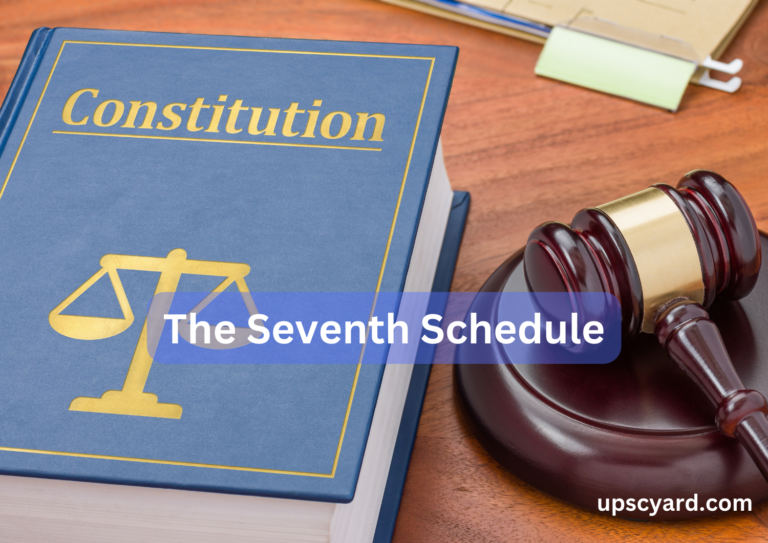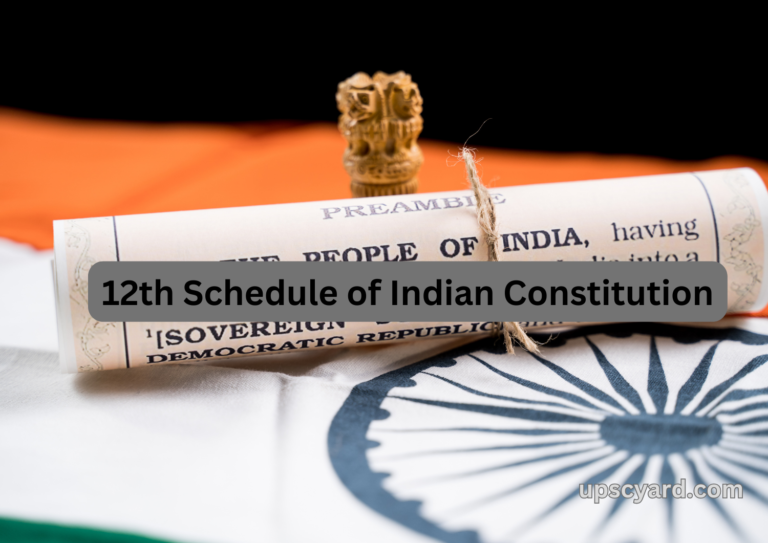Constitutional Provisions
Article 72: The President shall have the power to grant pardons, reprieves, respites or remissions of punishment or to suspend, remit or commute the sentence of any person convicted of any offence where the sentence is a sentence of death.
Article 161: Gives the Governor the “power to grant pardons, reprieves, respites or remissions of punishment or to suspend, remit or commute the sentence of any person convicted of any offence against any law relating to a matter to which the executive power of the state extends”.
The Presidential Pardoning Powers in India, Article 72
Article 72 of the Constitution bestows upon the President the authority to grant pardons to individuals who have undergone trial and conviction for various offenses. This power extends to several scenarios, including cases involving:
- Violation of Union Laws.
- Offenses tried in a court-martial (Military court).
- Sentences of death.
The primary aim of entrusting this power to the President is to maintain a mechanism for rectifying potential judicial errors in the application of the law and to provide relief from sentences deemed excessively severe.
The President’s pardoning power encompasses several forms of clemency:
- Pardon: This involves the complete absolution of the convict from both the conviction and the sentence. It wipes the slate clean, removing all penalties, punishments, and disqualifications.
- Commutation: This allows for the substitution of a more lenient punishment in place of a harsher one. For example, a death sentence may be commuted to rigorous imprisonment, and that, in turn, may be commuted to simple imprisonment.
- Remission: It involves a reduction in the sentence’s duration without changing its fundamental nature. For instance, a three-year sentence of rigorous imprisonment might be remitted to one year of rigorous imprisonment.
- Respite: This option enables the issuance of a reduced sentence in consideration of specific circumstances, like a convict’s physical disability or a woman offender’s pregnancy.
- Reprieve: A reprieve stays the execution of a sentence, particularly a death sentence, for a temporary period. It provides the convict with a window of time to seek a pardon or commutation from the President.
However, it’s essential to note that the President cannot exercise this power independently of the government. Several court cases have clarified that the President must act based on the advice of the Council of Ministers when considering mercy pleas. Notable cases that have established this include the Maru Ram vs Union of India in 1980 and the Dhananjoy Chatterjee vs State of West Bengal in 1994.
While the President is obligated to follow the advice of the Cabinet, Article 74(1) does provide a provision for the President to return the advice once for reconsideration. Nevertheless, if the Council of Ministers remains resolute in their decision, the President is bound to accept it.
Here’s how the procedure works: The Rashtrapati Bhawan forwards the mercy plea to the Home Ministry, requesting the Cabinet’s advice. The Home Ministry subsequently relays the plea to the concerned state government. The state government’s response is instrumental in shaping the Council of Ministers’ advice, which is ultimately presented to the President for a decision.
Pardoning powers of the Governor:
Article 161 empowers the Governor to “grant pardons, reprieves, respites, or remissions of punishment or to suspend, remit, or commute the sentence.” The Governor holds this authority for individuals convicted of offenses related to subjects falling under the State’s executive power.
President (Article 72):
- Empowered to grant pardons.
- Can pardon sentences issued in court-martial (military courts).
- Can pardon death sentences.
Governor (Article 161):
- Empowered to grant pardons.
- Cannot pardon sentences from court-martial.
- Cannot pardon death sentences.
Landmark Verdicts of Pardoning Powers
1. Dhananjoy Chatterjee Alias Dhana Vs State Of West Bengal, 1994 Case :
SC Held: The power under Art. 72 and 161 of the Constitution can be exercised by the Central and State Governments, not by the President or Governor on their own”.
2. Epuru Sudhakar Case (2006)
The Supreme Court clarified that the powers vested in the President or Governor under Articles 72 and 161 are open to judicial review. This means their decisions can be challenged in a court of law on various grounds, including:
(a) Lack of Application of Mind: If it can be demonstrated that the decision was made without due consideration or careful thought.
(b) Mala Fide: When it is evident that the decision was made with a malicious intent or improper purpose.
(c) Extraneous or Irrelevant Considerations: If the decision was influenced by factors that have no bearing on the matter at hand.
(d) Exclusion of Relevant Material: If relevant information or evidence was not taken into account when making the decision.
(e) Arbitrariness: When the decision appears to be made without any reasonable or justifiable basis.
3. Maru Ram vs Union of India case (1980)
The Supreme Court established that the power conferred by Article 72 is to be exercised based on the advice provided by the Central Government. The President is not free to act at their own discretion but is bound by the advice given by the Government. This ruling underscores the binding nature of the Government’s advice in such matters.
Available Legal Recourse for Individuals Sentenced to Death
- Confirmation by High Court: In the Indian legal system, a death sentence pronounced by a trial court must be upheld by a High Court to become final.
- Supreme Court Review: Article 137 of the Indian Constitution grants the Supreme Court the authority to review its own orders and judgments.
- Review Petition: The concerned individuals can file a review petition under Section 114 and Order 47 of the Code of Criminal Procedure (CrPC). If the review petition is rejected, they have the option to pursue a curative petition.
- Curative Petition: In cases where there is a gross violation of natural justice principles, petitioners can file a curative petition. This petition is then examined by the three most senior judges, as well as the bench of judges responsible for the original judgment.
- Mercy Petition: Convicts have the right to file a mercy petition. It must be submitted within seven days of being informed by the jail superintendent about the rejection of their previous petition. The power to pardon the petitioner lies with the President (under Article 72) and the Governor (under Article 161) of the Constitution, depending on the jurisdiction.




